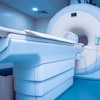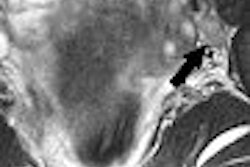CHICAGO - Proton magnetic resonance spectroscopy (H-MRS) has provided the first proof that smoking changes the chemistry of the brain -- but the good news is that the changes can be reversed, according to researchers from Germany.
Concentrations of a key brain metabolite -- N-acetylaspartate (NAA) -- are significantly lower in brains of smokers than in the brains of age-matched controls, said Dr. Okan Gür of the department of radiology at the University of Bonn in Germany. He reported the findings Tuesday at the 2006 RSNA meeting.
"But ... MRS conducted after six months of abstinence from smoking found that NAA levels had returned to normal," he said.
Gür and colleagues performed H-MRS in the second week after smoking cessation and additionally six months later on smokers with an average of 25 pack years of smoking history (n = 43) on a 1.5-tesla MR system (Gyroscan ACS-NT, Philips Medical Systems, Andover, MA) and on 35 healthy controls.
Two volumes of interest (VOI) were placed in the left prefrontal cortex and the anterior cingulate cortex to assess absolute and relative concentrations of NAA, total creatine (tCr), and choline-containing compounds.
At baseline, NAA concentration in the anterior cingulate cortex was 13.3 mmol/L in smokers and 13.9 mmol/L in controls (p = 0.01), Gür said. After six months, smokers who had remained smoke-free had NAA concentrations of 13.8 mmol/L, which was roughly comparable to controls.
But among 11 smokers who relapsed, the mean NAA concentration was 13.2 mmol/L, he said.
No significant differences were seen in NAA concentrations in the left prefrontal cortex, but there was a difference in total creatine concentrations in the prefrontal cortex that was associated with an increased risk of relapse. Smokers who relapsed had mean baseline total creatine levels of 7.6 mmol/L versus 7.0 mmol/L for smokers who successfully stopped smoking.
And among smokers who successfully quite, total creatine concentration was 8.2 mmol/L at six months.
Total creatine is "associated with stress, so it suggests that smokers who were more stressed at baseline had more difficulty quitting and that successful smoking cessation is itself a stressful event," Gür said.
By M. Mary Conroy
AuntMinnie.com contributing writer
November 28, 2006
Related Reading
Smoking stalls neurocognitive recovery in former alcoholics, April 21, 2006
Copyright © 2006 AuntMinnie.com




















